Environmental Analysis of the Automotive Industry: A Volvo Cars Report
VerifiedAdded on 2021/02/20
|10
|3212
|184
Report
AI Summary
This report provides an environmental analysis of the automotive industry, with a specific focus on Volvo Cars. It begins with an introduction to environmental analysis and its importance in understanding a company's performance. The main body of the report utilizes frameworks like Porter's Five Forces and PESTLE analysis to examine the major forces impacting the automotive industry, organizational changes, and the transition to electric vehicles. The report explores the reasons behind the shift towards electric car manufacturing, highlighting the economic and environmental benefits. It also identifies emerging opportunities for business executives and entrepreneurs in the electric vehicle market, such as public EV chargers and partnerships with restaurants and cafes. Additionally, the report critically evaluates businesses in the worldwide automotive industry that may not be profitable in the long run, and concludes with a summary of the key findings and implications. The report emphasizes the growing importance of electric vehicles and the need for businesses to adapt to changing environmental and economic conditions. The report is useful for students, researchers, and professionals interested in the automotive industry.
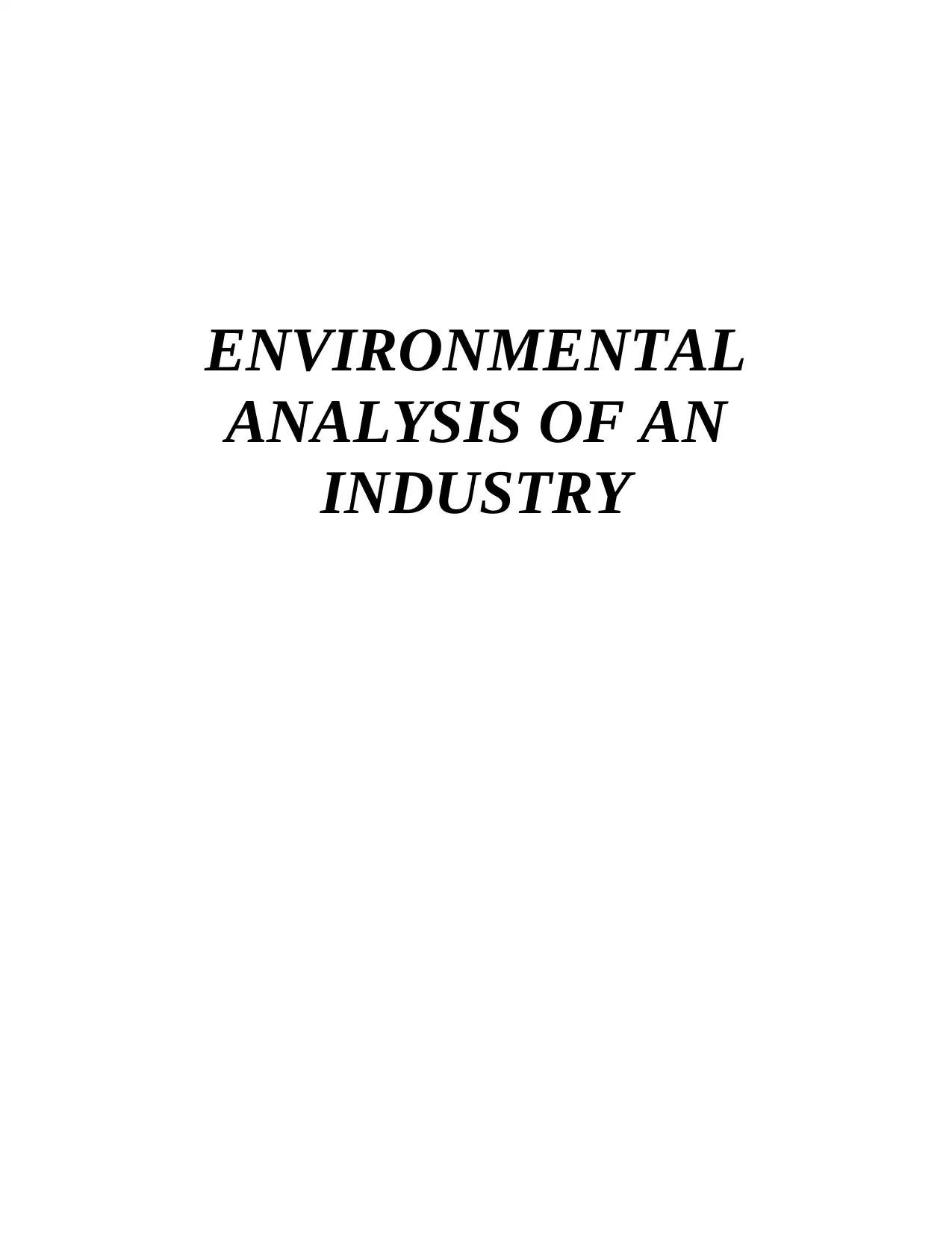
ENVIRONMENTAL
ANALYSIS OF AN
INDUSTRY
ANALYSIS OF AN
INDUSTRY
Paraphrase This Document
Need a fresh take? Get an instant paraphrase of this document with our AI Paraphraser
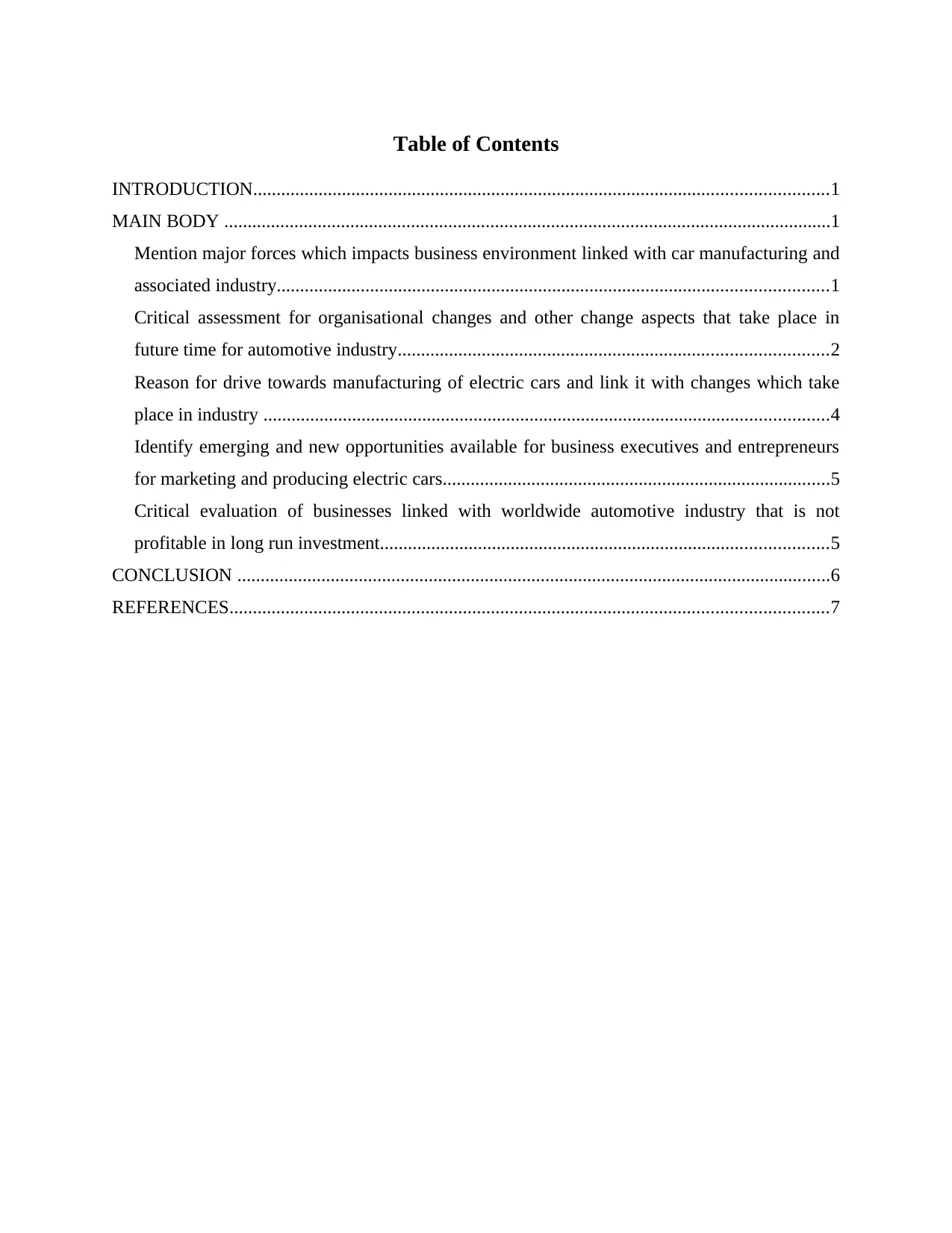
Table of Contents
INTRODUCTION...........................................................................................................................1
MAIN BODY ..................................................................................................................................1
Mention major forces which impacts business environment linked with car manufacturing and
associated industry......................................................................................................................1
Critical assessment for organisational changes and other change aspects that take place in
future time for automotive industry............................................................................................2
Reason for drive towards manufacturing of electric cars and link it with changes which take
place in industry .........................................................................................................................4
Identify emerging and new opportunities available for business executives and entrepreneurs
for marketing and producing electric cars...................................................................................5
Critical evaluation of businesses linked with worldwide automotive industry that is not
profitable in long run investment................................................................................................5
CONCLUSION ...............................................................................................................................6
REFERENCES................................................................................................................................7
INTRODUCTION...........................................................................................................................1
MAIN BODY ..................................................................................................................................1
Mention major forces which impacts business environment linked with car manufacturing and
associated industry......................................................................................................................1
Critical assessment for organisational changes and other change aspects that take place in
future time for automotive industry............................................................................................2
Reason for drive towards manufacturing of electric cars and link it with changes which take
place in industry .........................................................................................................................4
Identify emerging and new opportunities available for business executives and entrepreneurs
for marketing and producing electric cars...................................................................................5
Critical evaluation of businesses linked with worldwide automotive industry that is not
profitable in long run investment................................................................................................5
CONCLUSION ...............................................................................................................................6
REFERENCES................................................................................................................................7
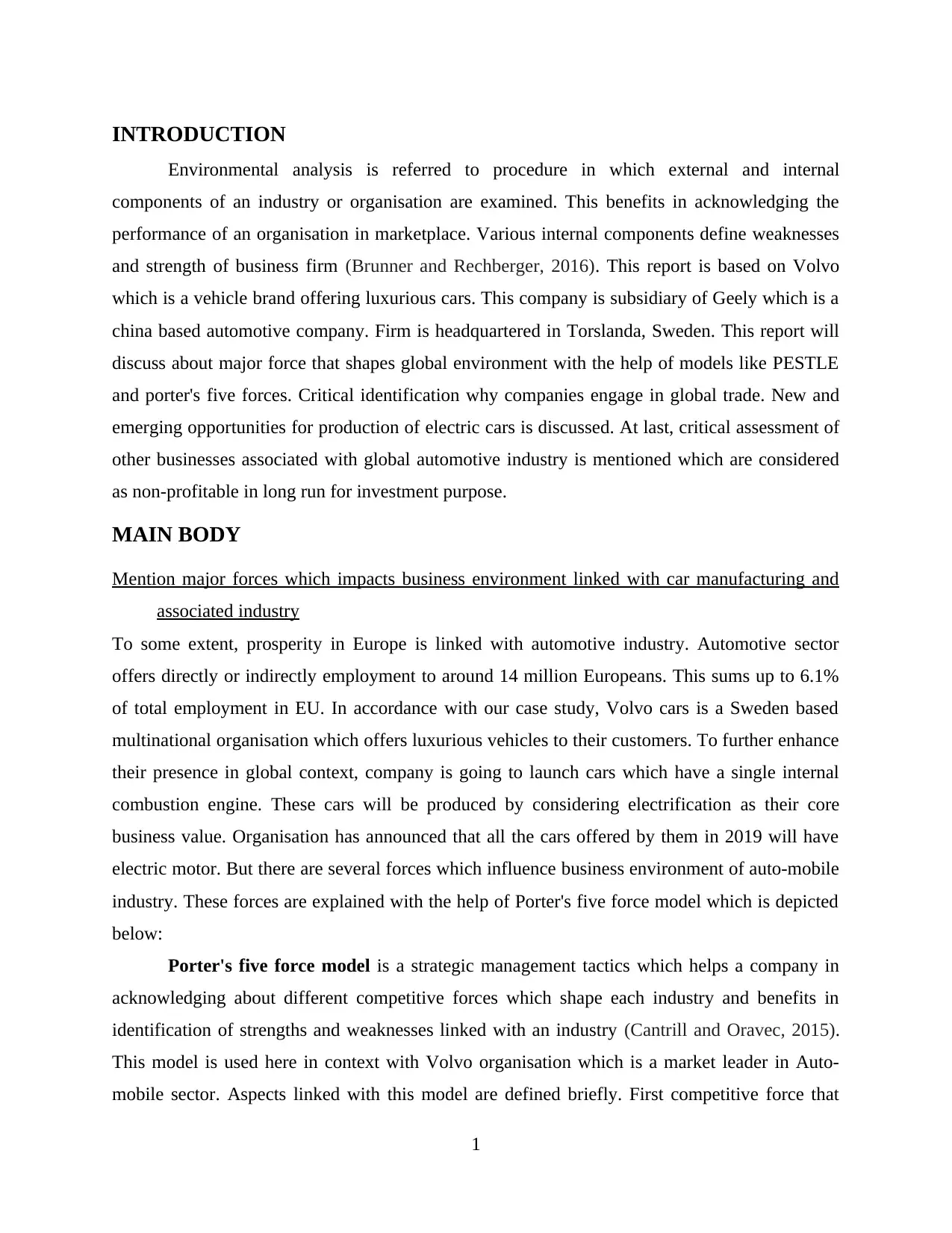
INTRODUCTION
Environmental analysis is referred to procedure in which external and internal
components of an industry or organisation are examined. This benefits in acknowledging the
performance of an organisation in marketplace. Various internal components define weaknesses
and strength of business firm (Brunner and Rechberger, 2016). This report is based on Volvo
which is a vehicle brand offering luxurious cars. This company is subsidiary of Geely which is a
china based automotive company. Firm is headquartered in Torslanda, Sweden. This report will
discuss about major force that shapes global environment with the help of models like PESTLE
and porter's five forces. Critical identification why companies engage in global trade. New and
emerging opportunities for production of electric cars is discussed. At last, critical assessment of
other businesses associated with global automotive industry is mentioned which are considered
as non-profitable in long run for investment purpose.
MAIN BODY
Mention major forces which impacts business environment linked with car manufacturing and
associated industry
To some extent, prosperity in Europe is linked with automotive industry. Automotive sector
offers directly or indirectly employment to around 14 million Europeans. This sums up to 6.1%
of total employment in EU. In accordance with our case study, Volvo cars is a Sweden based
multinational organisation which offers luxurious vehicles to their customers. To further enhance
their presence in global context, company is going to launch cars which have a single internal
combustion engine. These cars will be produced by considering electrification as their core
business value. Organisation has announced that all the cars offered by them in 2019 will have
electric motor. But there are several forces which influence business environment of auto-mobile
industry. These forces are explained with the help of Porter's five force model which is depicted
below:
Porter's five force model is a strategic management tactics which helps a company in
acknowledging about different competitive forces which shape each industry and benefits in
identification of strengths and weaknesses linked with an industry (Cantrill and Oravec, 2015).
This model is used here in context with Volvo organisation which is a market leader in Auto-
mobile sector. Aspects linked with this model are defined briefly. First competitive force that
1
Environmental analysis is referred to procedure in which external and internal
components of an industry or organisation are examined. This benefits in acknowledging the
performance of an organisation in marketplace. Various internal components define weaknesses
and strength of business firm (Brunner and Rechberger, 2016). This report is based on Volvo
which is a vehicle brand offering luxurious cars. This company is subsidiary of Geely which is a
china based automotive company. Firm is headquartered in Torslanda, Sweden. This report will
discuss about major force that shapes global environment with the help of models like PESTLE
and porter's five forces. Critical identification why companies engage in global trade. New and
emerging opportunities for production of electric cars is discussed. At last, critical assessment of
other businesses associated with global automotive industry is mentioned which are considered
as non-profitable in long run for investment purpose.
MAIN BODY
Mention major forces which impacts business environment linked with car manufacturing and
associated industry
To some extent, prosperity in Europe is linked with automotive industry. Automotive sector
offers directly or indirectly employment to around 14 million Europeans. This sums up to 6.1%
of total employment in EU. In accordance with our case study, Volvo cars is a Sweden based
multinational organisation which offers luxurious vehicles to their customers. To further enhance
their presence in global context, company is going to launch cars which have a single internal
combustion engine. These cars will be produced by considering electrification as their core
business value. Organisation has announced that all the cars offered by them in 2019 will have
electric motor. But there are several forces which influence business environment of auto-mobile
industry. These forces are explained with the help of Porter's five force model which is depicted
below:
Porter's five force model is a strategic management tactics which helps a company in
acknowledging about different competitive forces which shape each industry and benefits in
identification of strengths and weaknesses linked with an industry (Cantrill and Oravec, 2015).
This model is used here in context with Volvo organisation which is a market leader in Auto-
mobile sector. Aspects linked with this model are defined briefly. First competitive force that
1
⊘ This is a preview!⊘
Do you want full access?
Subscribe today to unlock all pages.

Trusted by 1+ million students worldwide
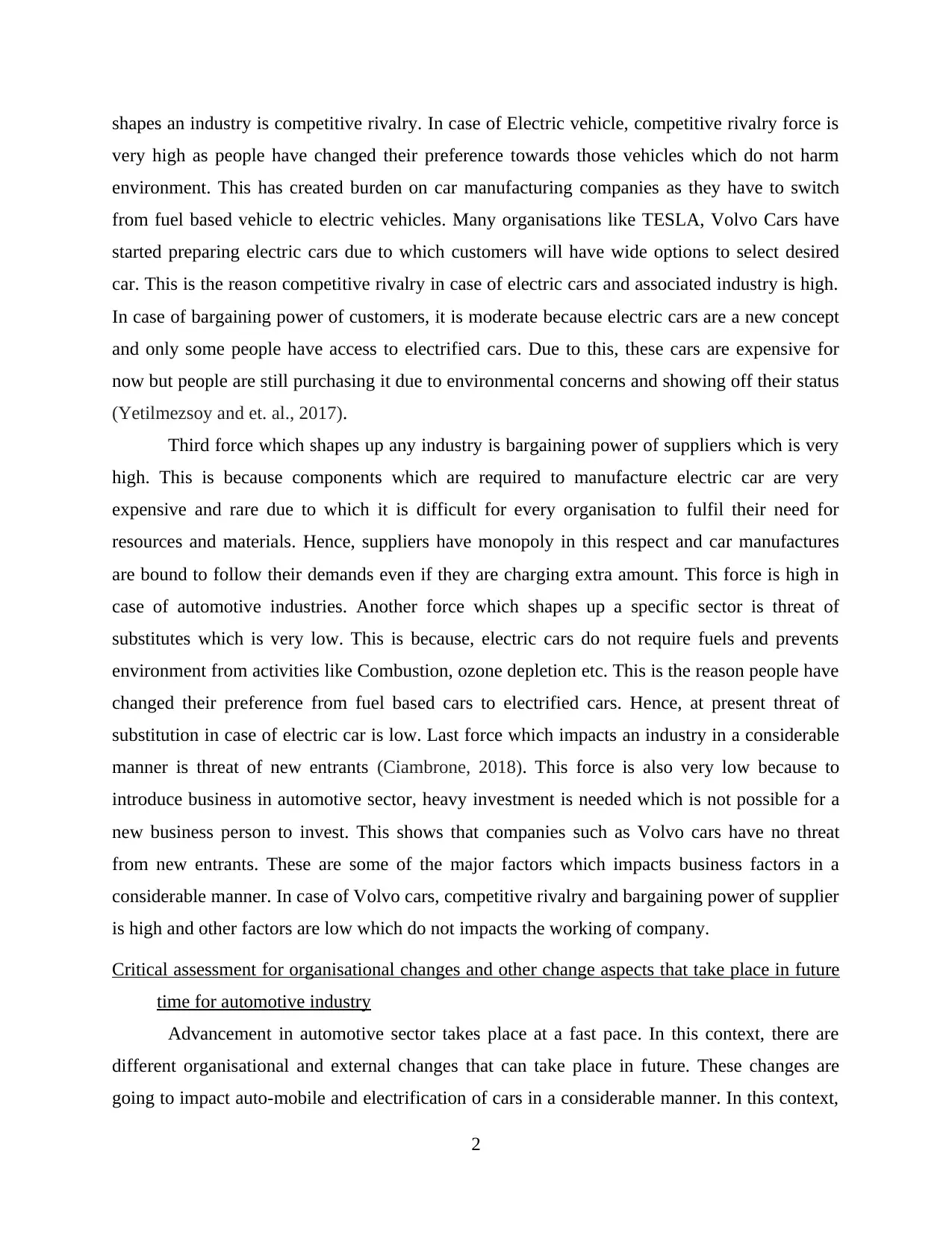
shapes an industry is competitive rivalry. In case of Electric vehicle, competitive rivalry force is
very high as people have changed their preference towards those vehicles which do not harm
environment. This has created burden on car manufacturing companies as they have to switch
from fuel based vehicle to electric vehicles. Many organisations like TESLA, Volvo Cars have
started preparing electric cars due to which customers will have wide options to select desired
car. This is the reason competitive rivalry in case of electric cars and associated industry is high.
In case of bargaining power of customers, it is moderate because electric cars are a new concept
and only some people have access to electrified cars. Due to this, these cars are expensive for
now but people are still purchasing it due to environmental concerns and showing off their status
(Yetilmezsoy and et. al., 2017).
Third force which shapes up any industry is bargaining power of suppliers which is very
high. This is because components which are required to manufacture electric car are very
expensive and rare due to which it is difficult for every organisation to fulfil their need for
resources and materials. Hence, suppliers have monopoly in this respect and car manufactures
are bound to follow their demands even if they are charging extra amount. This force is high in
case of automotive industries. Another force which shapes up a specific sector is threat of
substitutes which is very low. This is because, electric cars do not require fuels and prevents
environment from activities like Combustion, ozone depletion etc. This is the reason people have
changed their preference from fuel based cars to electrified cars. Hence, at present threat of
substitution in case of electric car is low. Last force which impacts an industry in a considerable
manner is threat of new entrants (Ciambrone, 2018). This force is also very low because to
introduce business in automotive sector, heavy investment is needed which is not possible for a
new business person to invest. This shows that companies such as Volvo cars have no threat
from new entrants. These are some of the major factors which impacts business factors in a
considerable manner. In case of Volvo cars, competitive rivalry and bargaining power of supplier
is high and other factors are low which do not impacts the working of company.
Critical assessment for organisational changes and other change aspects that take place in future
time for automotive industry
Advancement in automotive sector takes place at a fast pace. In this context, there are
different organisational and external changes that can take place in future. These changes are
going to impact auto-mobile and electrification of cars in a considerable manner. In this context,
2
very high as people have changed their preference towards those vehicles which do not harm
environment. This has created burden on car manufacturing companies as they have to switch
from fuel based vehicle to electric vehicles. Many organisations like TESLA, Volvo Cars have
started preparing electric cars due to which customers will have wide options to select desired
car. This is the reason competitive rivalry in case of electric cars and associated industry is high.
In case of bargaining power of customers, it is moderate because electric cars are a new concept
and only some people have access to electrified cars. Due to this, these cars are expensive for
now but people are still purchasing it due to environmental concerns and showing off their status
(Yetilmezsoy and et. al., 2017).
Third force which shapes up any industry is bargaining power of suppliers which is very
high. This is because components which are required to manufacture electric car are very
expensive and rare due to which it is difficult for every organisation to fulfil their need for
resources and materials. Hence, suppliers have monopoly in this respect and car manufactures
are bound to follow their demands even if they are charging extra amount. This force is high in
case of automotive industries. Another force which shapes up a specific sector is threat of
substitutes which is very low. This is because, electric cars do not require fuels and prevents
environment from activities like Combustion, ozone depletion etc. This is the reason people have
changed their preference from fuel based cars to electrified cars. Hence, at present threat of
substitution in case of electric car is low. Last force which impacts an industry in a considerable
manner is threat of new entrants (Ciambrone, 2018). This force is also very low because to
introduce business in automotive sector, heavy investment is needed which is not possible for a
new business person to invest. This shows that companies such as Volvo cars have no threat
from new entrants. These are some of the major factors which impacts business factors in a
considerable manner. In case of Volvo cars, competitive rivalry and bargaining power of supplier
is high and other factors are low which do not impacts the working of company.
Critical assessment for organisational changes and other change aspects that take place in future
time for automotive industry
Advancement in automotive sector takes place at a fast pace. In this context, there are
different organisational and external changes that can take place in future. These changes are
going to impact auto-mobile and electrification of cars in a considerable manner. In this context,
2
Paraphrase This Document
Need a fresh take? Get an instant paraphrase of this document with our AI Paraphraser
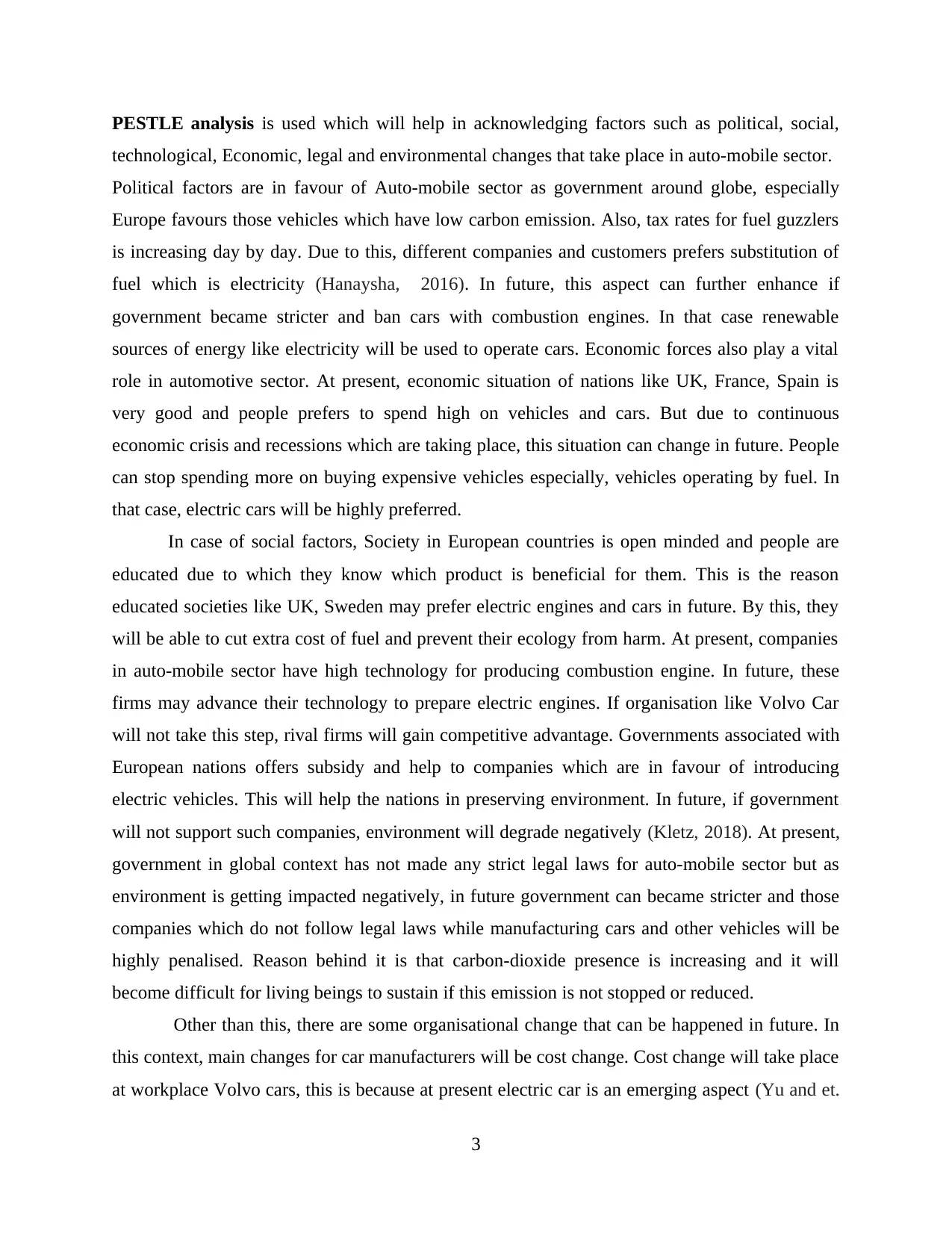
PESTLE analysis is used which will help in acknowledging factors such as political, social,
technological, Economic, legal and environmental changes that take place in auto-mobile sector.
Political factors are in favour of Auto-mobile sector as government around globe, especially
Europe favours those vehicles which have low carbon emission. Also, tax rates for fuel guzzlers
is increasing day by day. Due to this, different companies and customers prefers substitution of
fuel which is electricity (Hanaysha, 2016). In future, this aspect can further enhance if
government became stricter and ban cars with combustion engines. In that case renewable
sources of energy like electricity will be used to operate cars. Economic forces also play a vital
role in automotive sector. At present, economic situation of nations like UK, France, Spain is
very good and people prefers to spend high on vehicles and cars. But due to continuous
economic crisis and recessions which are taking place, this situation can change in future. People
can stop spending more on buying expensive vehicles especially, vehicles operating by fuel. In
that case, electric cars will be highly preferred.
In case of social factors, Society in European countries is open minded and people are
educated due to which they know which product is beneficial for them. This is the reason
educated societies like UK, Sweden may prefer electric engines and cars in future. By this, they
will be able to cut extra cost of fuel and prevent their ecology from harm. At present, companies
in auto-mobile sector have high technology for producing combustion engine. In future, these
firms may advance their technology to prepare electric engines. If organisation like Volvo Car
will not take this step, rival firms will gain competitive advantage. Governments associated with
European nations offers subsidy and help to companies which are in favour of introducing
electric vehicles. This will help the nations in preserving environment. In future, if government
will not support such companies, environment will degrade negatively (Kletz, 2018). At present,
government in global context has not made any strict legal laws for auto-mobile sector but as
environment is getting impacted negatively, in future government can became stricter and those
companies which do not follow legal laws while manufacturing cars and other vehicles will be
highly penalised. Reason behind it is that carbon-dioxide presence is increasing and it will
become difficult for living beings to sustain if this emission is not stopped or reduced.
Other than this, there are some organisational change that can be happened in future. In
this context, main changes for car manufacturers will be cost change. Cost change will take place
at workplace Volvo cars, this is because at present electric car is an emerging aspect (Yu and et.
3
technological, Economic, legal and environmental changes that take place in auto-mobile sector.
Political factors are in favour of Auto-mobile sector as government around globe, especially
Europe favours those vehicles which have low carbon emission. Also, tax rates for fuel guzzlers
is increasing day by day. Due to this, different companies and customers prefers substitution of
fuel which is electricity (Hanaysha, 2016). In future, this aspect can further enhance if
government became stricter and ban cars with combustion engines. In that case renewable
sources of energy like electricity will be used to operate cars. Economic forces also play a vital
role in automotive sector. At present, economic situation of nations like UK, France, Spain is
very good and people prefers to spend high on vehicles and cars. But due to continuous
economic crisis and recessions which are taking place, this situation can change in future. People
can stop spending more on buying expensive vehicles especially, vehicles operating by fuel. In
that case, electric cars will be highly preferred.
In case of social factors, Society in European countries is open minded and people are
educated due to which they know which product is beneficial for them. This is the reason
educated societies like UK, Sweden may prefer electric engines and cars in future. By this, they
will be able to cut extra cost of fuel and prevent their ecology from harm. At present, companies
in auto-mobile sector have high technology for producing combustion engine. In future, these
firms may advance their technology to prepare electric engines. If organisation like Volvo Car
will not take this step, rival firms will gain competitive advantage. Governments associated with
European nations offers subsidy and help to companies which are in favour of introducing
electric vehicles. This will help the nations in preserving environment. In future, if government
will not support such companies, environment will degrade negatively (Kletz, 2018). At present,
government in global context has not made any strict legal laws for auto-mobile sector but as
environment is getting impacted negatively, in future government can became stricter and those
companies which do not follow legal laws while manufacturing cars and other vehicles will be
highly penalised. Reason behind it is that carbon-dioxide presence is increasing and it will
become difficult for living beings to sustain if this emission is not stopped or reduced.
Other than this, there are some organisational change that can be happened in future. In
this context, main changes for car manufacturers will be cost change. Cost change will take place
at workplace Volvo cars, this is because at present electric car is an emerging aspect (Yu and et.
3
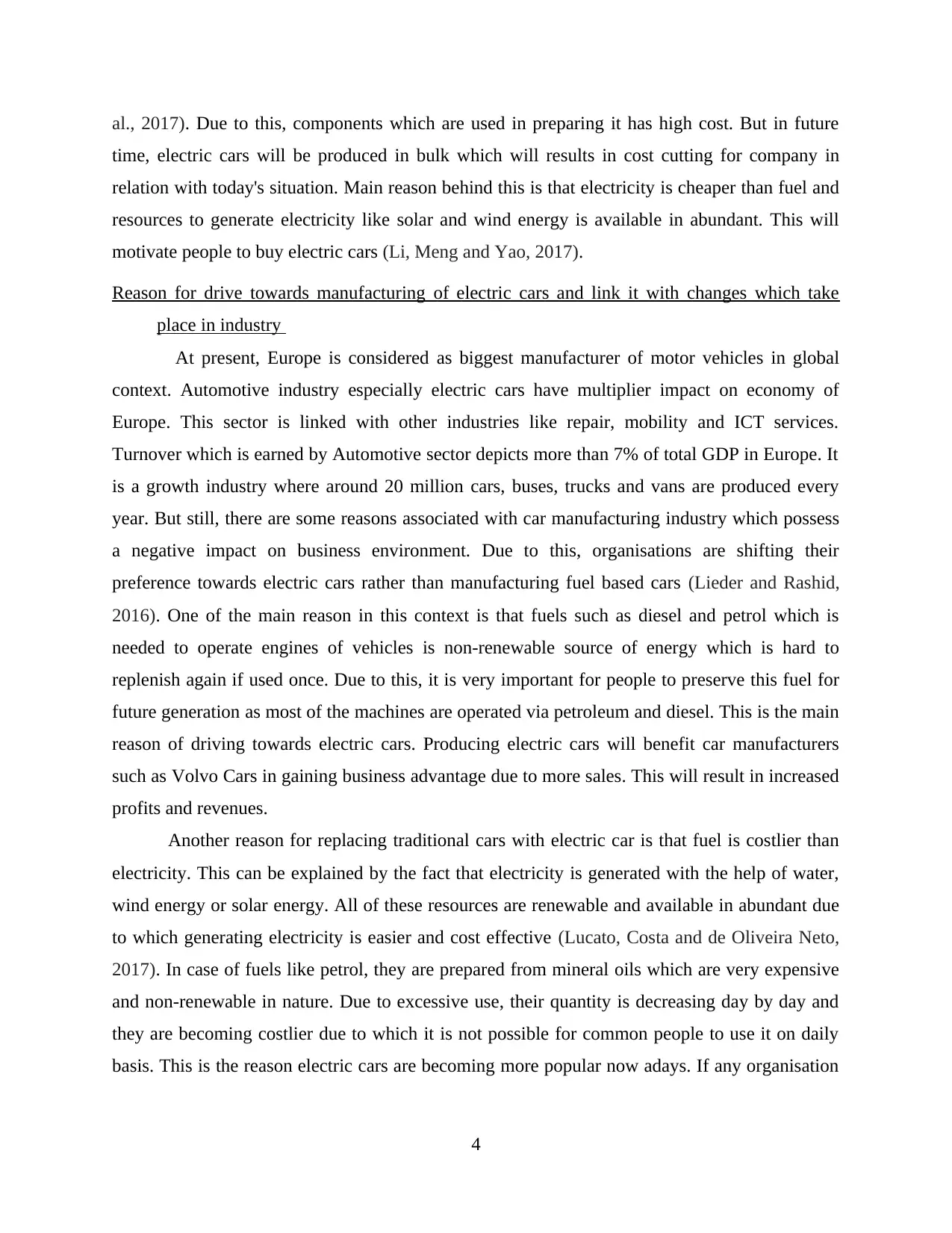
al., 2017). Due to this, components which are used in preparing it has high cost. But in future
time, electric cars will be produced in bulk which will results in cost cutting for company in
relation with today's situation. Main reason behind this is that electricity is cheaper than fuel and
resources to generate electricity like solar and wind energy is available in abundant. This will
motivate people to buy electric cars (Li, Meng and Yao, 2017).
Reason for drive towards manufacturing of electric cars and link it with changes which take
place in industry
At present, Europe is considered as biggest manufacturer of motor vehicles in global
context. Automotive industry especially electric cars have multiplier impact on economy of
Europe. This sector is linked with other industries like repair, mobility and ICT services.
Turnover which is earned by Automotive sector depicts more than 7% of total GDP in Europe. It
is a growth industry where around 20 million cars, buses, trucks and vans are produced every
year. But still, there are some reasons associated with car manufacturing industry which possess
a negative impact on business environment. Due to this, organisations are shifting their
preference towards electric cars rather than manufacturing fuel based cars (Lieder and Rashid,
2016). One of the main reason in this context is that fuels such as diesel and petrol which is
needed to operate engines of vehicles is non-renewable source of energy which is hard to
replenish again if used once. Due to this, it is very important for people to preserve this fuel for
future generation as most of the machines are operated via petroleum and diesel. This is the main
reason of driving towards electric cars. Producing electric cars will benefit car manufacturers
such as Volvo Cars in gaining business advantage due to more sales. This will result in increased
profits and revenues.
Another reason for replacing traditional cars with electric car is that fuel is costlier than
electricity. This can be explained by the fact that electricity is generated with the help of water,
wind energy or solar energy. All of these resources are renewable and available in abundant due
to which generating electricity is easier and cost effective (Lucato, Costa and de Oliveira Neto,
2017). In case of fuels like petrol, they are prepared from mineral oils which are very expensive
and non-renewable in nature. Due to excessive use, their quantity is decreasing day by day and
they are becoming costlier due to which it is not possible for common people to use it on daily
basis. This is the reason electric cars are becoming more popular now adays. If any organisation
4
time, electric cars will be produced in bulk which will results in cost cutting for company in
relation with today's situation. Main reason behind this is that electricity is cheaper than fuel and
resources to generate electricity like solar and wind energy is available in abundant. This will
motivate people to buy electric cars (Li, Meng and Yao, 2017).
Reason for drive towards manufacturing of electric cars and link it with changes which take
place in industry
At present, Europe is considered as biggest manufacturer of motor vehicles in global
context. Automotive industry especially electric cars have multiplier impact on economy of
Europe. This sector is linked with other industries like repair, mobility and ICT services.
Turnover which is earned by Automotive sector depicts more than 7% of total GDP in Europe. It
is a growth industry where around 20 million cars, buses, trucks and vans are produced every
year. But still, there are some reasons associated with car manufacturing industry which possess
a negative impact on business environment. Due to this, organisations are shifting their
preference towards electric cars rather than manufacturing fuel based cars (Lieder and Rashid,
2016). One of the main reason in this context is that fuels such as diesel and petrol which is
needed to operate engines of vehicles is non-renewable source of energy which is hard to
replenish again if used once. Due to this, it is very important for people to preserve this fuel for
future generation as most of the machines are operated via petroleum and diesel. This is the main
reason of driving towards electric cars. Producing electric cars will benefit car manufacturers
such as Volvo Cars in gaining business advantage due to more sales. This will result in increased
profits and revenues.
Another reason for replacing traditional cars with electric car is that fuel is costlier than
electricity. This can be explained by the fact that electricity is generated with the help of water,
wind energy or solar energy. All of these resources are renewable and available in abundant due
to which generating electricity is easier and cost effective (Lucato, Costa and de Oliveira Neto,
2017). In case of fuels like petrol, they are prepared from mineral oils which are very expensive
and non-renewable in nature. Due to excessive use, their quantity is decreasing day by day and
they are becoming costlier due to which it is not possible for common people to use it on daily
basis. This is the reason electric cars are becoming more popular now adays. If any organisation
4
⊘ This is a preview!⊘
Do you want full access?
Subscribe today to unlock all pages.

Trusted by 1+ million students worldwide
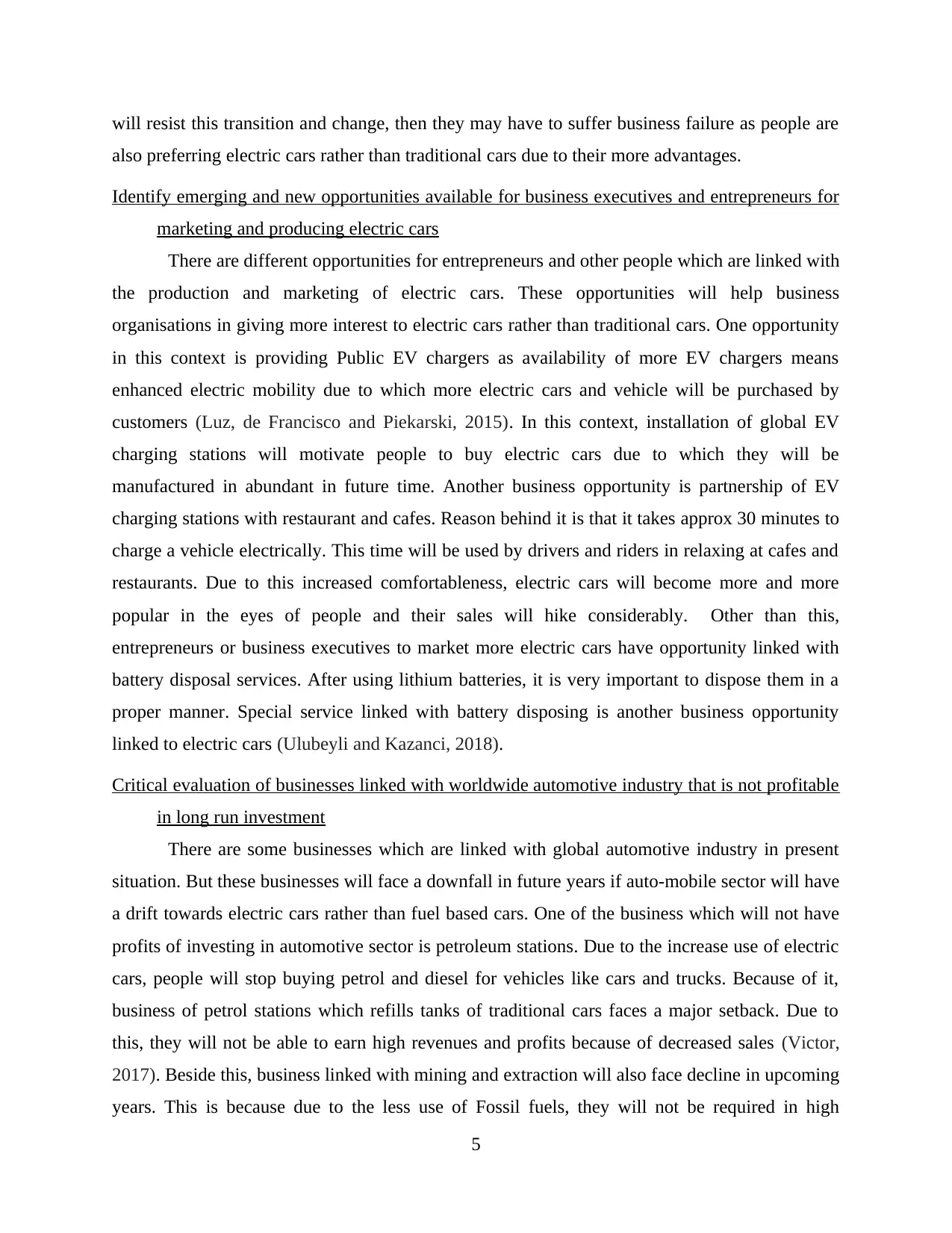
will resist this transition and change, then they may have to suffer business failure as people are
also preferring electric cars rather than traditional cars due to their more advantages.
Identify emerging and new opportunities available for business executives and entrepreneurs for
marketing and producing electric cars
There are different opportunities for entrepreneurs and other people which are linked with
the production and marketing of electric cars. These opportunities will help business
organisations in giving more interest to electric cars rather than traditional cars. One opportunity
in this context is providing Public EV chargers as availability of more EV chargers means
enhanced electric mobility due to which more electric cars and vehicle will be purchased by
customers (Luz, de Francisco and Piekarski, 2015). In this context, installation of global EV
charging stations will motivate people to buy electric cars due to which they will be
manufactured in abundant in future time. Another business opportunity is partnership of EV
charging stations with restaurant and cafes. Reason behind it is that it takes approx 30 minutes to
charge a vehicle electrically. This time will be used by drivers and riders in relaxing at cafes and
restaurants. Due to this increased comfortableness, electric cars will become more and more
popular in the eyes of people and their sales will hike considerably. Other than this,
entrepreneurs or business executives to market more electric cars have opportunity linked with
battery disposal services. After using lithium batteries, it is very important to dispose them in a
proper manner. Special service linked with battery disposing is another business opportunity
linked to electric cars (Ulubeyli and Kazanci, 2018).
Critical evaluation of businesses linked with worldwide automotive industry that is not profitable
in long run investment
There are some businesses which are linked with global automotive industry in present
situation. But these businesses will face a downfall in future years if auto-mobile sector will have
a drift towards electric cars rather than fuel based cars. One of the business which will not have
profits of investing in automotive sector is petroleum stations. Due to the increase use of electric
cars, people will stop buying petrol and diesel for vehicles like cars and trucks. Because of it,
business of petrol stations which refills tanks of traditional cars faces a major setback. Due to
this, they will not be able to earn high revenues and profits because of decreased sales (Victor,
2017). Beside this, business linked with mining and extraction will also face decline in upcoming
years. This is because due to the less use of Fossil fuels, they will not be required in high
5
also preferring electric cars rather than traditional cars due to their more advantages.
Identify emerging and new opportunities available for business executives and entrepreneurs for
marketing and producing electric cars
There are different opportunities for entrepreneurs and other people which are linked with
the production and marketing of electric cars. These opportunities will help business
organisations in giving more interest to electric cars rather than traditional cars. One opportunity
in this context is providing Public EV chargers as availability of more EV chargers means
enhanced electric mobility due to which more electric cars and vehicle will be purchased by
customers (Luz, de Francisco and Piekarski, 2015). In this context, installation of global EV
charging stations will motivate people to buy electric cars due to which they will be
manufactured in abundant in future time. Another business opportunity is partnership of EV
charging stations with restaurant and cafes. Reason behind it is that it takes approx 30 minutes to
charge a vehicle electrically. This time will be used by drivers and riders in relaxing at cafes and
restaurants. Due to this increased comfortableness, electric cars will become more and more
popular in the eyes of people and their sales will hike considerably. Other than this,
entrepreneurs or business executives to market more electric cars have opportunity linked with
battery disposal services. After using lithium batteries, it is very important to dispose them in a
proper manner. Special service linked with battery disposing is another business opportunity
linked to electric cars (Ulubeyli and Kazanci, 2018).
Critical evaluation of businesses linked with worldwide automotive industry that is not profitable
in long run investment
There are some businesses which are linked with global automotive industry in present
situation. But these businesses will face a downfall in future years if auto-mobile sector will have
a drift towards electric cars rather than fuel based cars. One of the business which will not have
profits of investing in automotive sector is petroleum stations. Due to the increase use of electric
cars, people will stop buying petrol and diesel for vehicles like cars and trucks. Because of it,
business of petrol stations which refills tanks of traditional cars faces a major setback. Due to
this, they will not be able to earn high revenues and profits because of decreased sales (Victor,
2017). Beside this, business linked with mining and extraction will also face decline in upcoming
years. This is because due to the less use of Fossil fuels, they will not be required in high
5
Paraphrase This Document
Need a fresh take? Get an instant paraphrase of this document with our AI Paraphraser
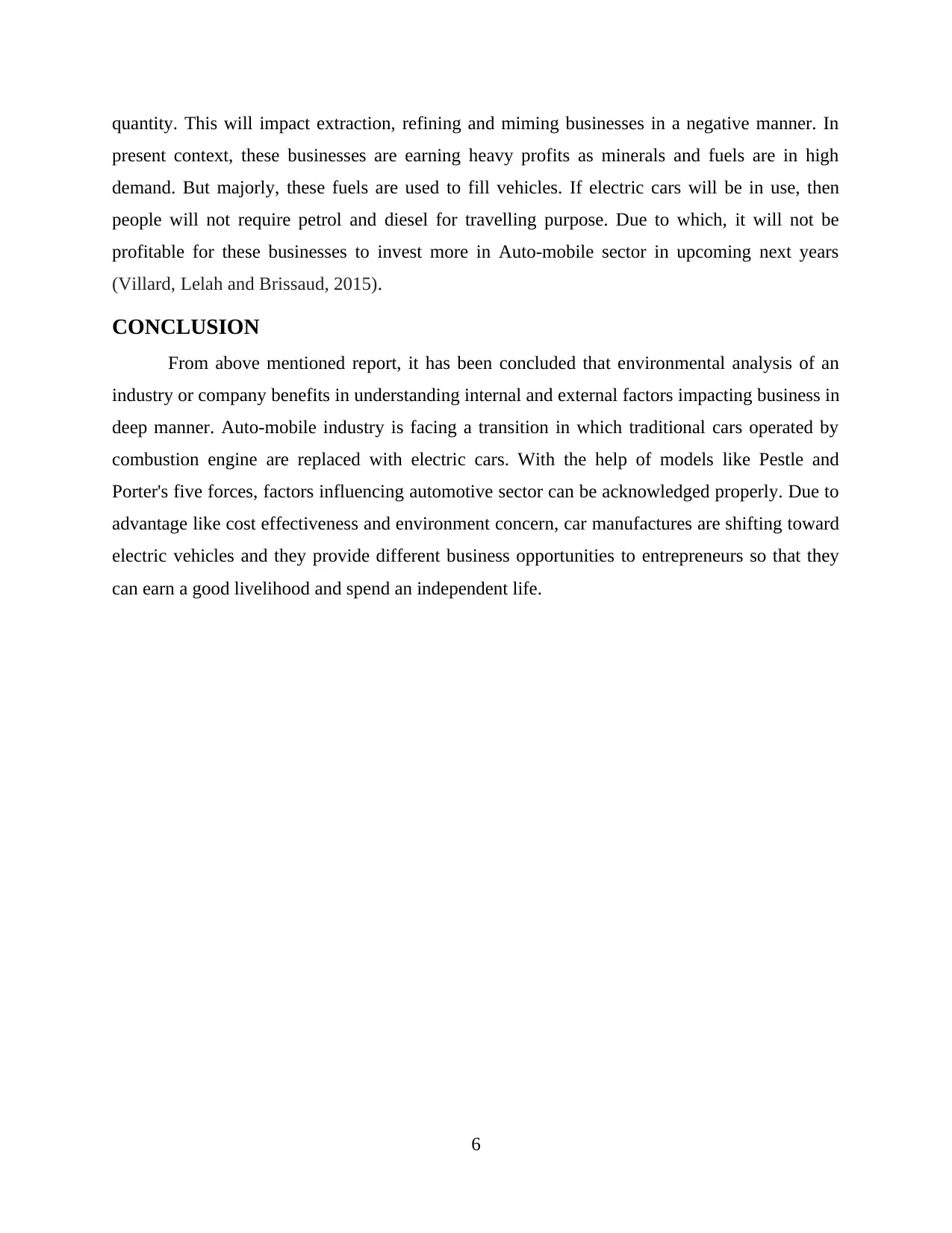
quantity. This will impact extraction, refining and miming businesses in a negative manner. In
present context, these businesses are earning heavy profits as minerals and fuels are in high
demand. But majorly, these fuels are used to fill vehicles. If electric cars will be in use, then
people will not require petrol and diesel for travelling purpose. Due to which, it will not be
profitable for these businesses to invest more in Auto-mobile sector in upcoming next years
(Villard, Lelah and Brissaud, 2015).
CONCLUSION
From above mentioned report, it has been concluded that environmental analysis of an
industry or company benefits in understanding internal and external factors impacting business in
deep manner. Auto-mobile industry is facing a transition in which traditional cars operated by
combustion engine are replaced with electric cars. With the help of models like Pestle and
Porter's five forces, factors influencing automotive sector can be acknowledged properly. Due to
advantage like cost effectiveness and environment concern, car manufactures are shifting toward
electric vehicles and they provide different business opportunities to entrepreneurs so that they
can earn a good livelihood and spend an independent life.
6
present context, these businesses are earning heavy profits as minerals and fuels are in high
demand. But majorly, these fuels are used to fill vehicles. If electric cars will be in use, then
people will not require petrol and diesel for travelling purpose. Due to which, it will not be
profitable for these businesses to invest more in Auto-mobile sector in upcoming next years
(Villard, Lelah and Brissaud, 2015).
CONCLUSION
From above mentioned report, it has been concluded that environmental analysis of an
industry or company benefits in understanding internal and external factors impacting business in
deep manner. Auto-mobile industry is facing a transition in which traditional cars operated by
combustion engine are replaced with electric cars. With the help of models like Pestle and
Porter's five forces, factors influencing automotive sector can be acknowledged properly. Due to
advantage like cost effectiveness and environment concern, car manufactures are shifting toward
electric vehicles and they provide different business opportunities to entrepreneurs so that they
can earn a good livelihood and spend an independent life.
6
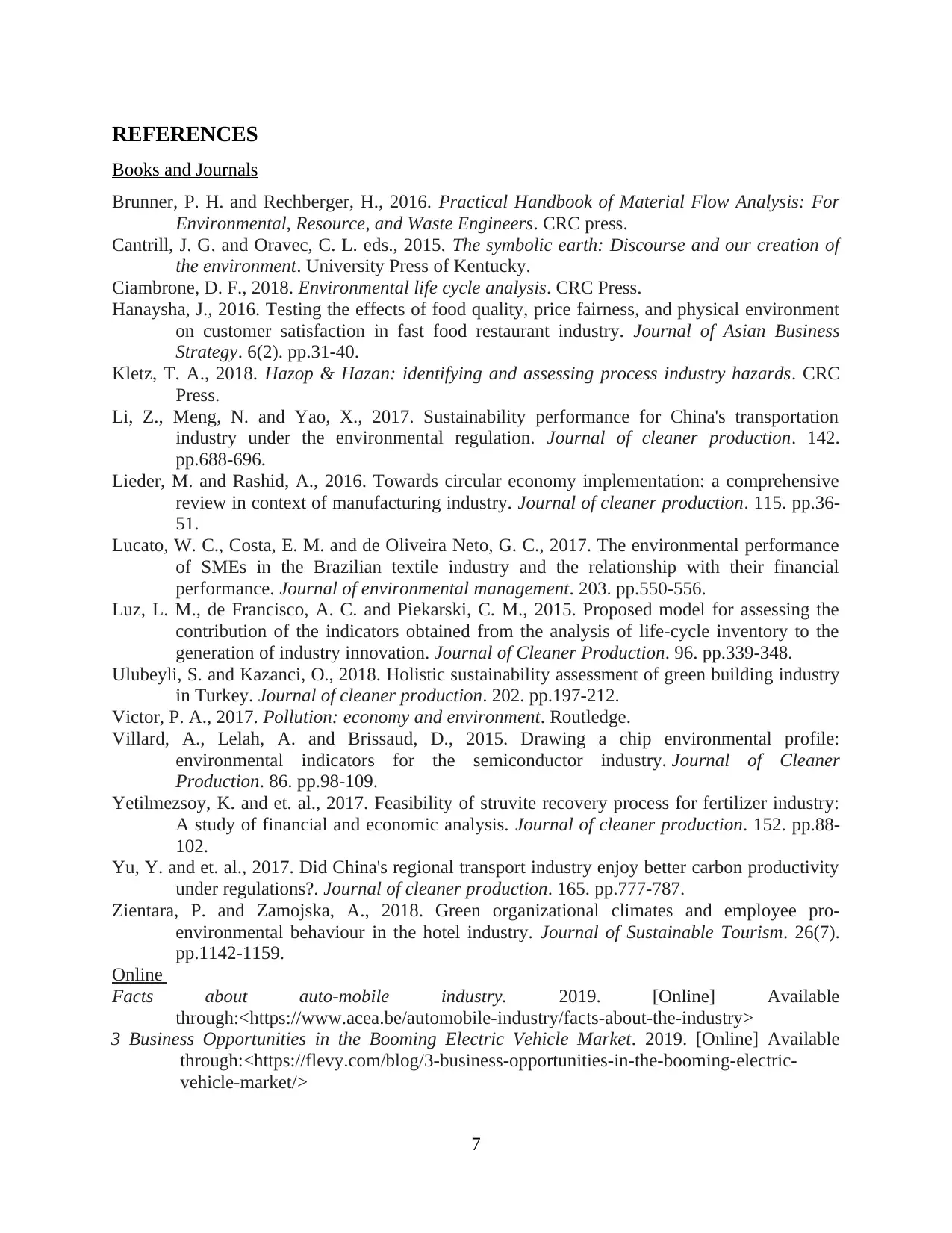
REFERENCES
Books and Journals
Brunner, P. H. and Rechberger, H., 2016. Practical Handbook of Material Flow Analysis: For
Environmental, Resource, and Waste Engineers. CRC press.
Cantrill, J. G. and Oravec, C. L. eds., 2015. The symbolic earth: Discourse and our creation of
the environment. University Press of Kentucky.
Ciambrone, D. F., 2018. Environmental life cycle analysis. CRC Press.
Hanaysha, J., 2016. Testing the effects of food quality, price fairness, and physical environment
on customer satisfaction in fast food restaurant industry. Journal of Asian Business
Strategy. 6(2). pp.31-40.
Kletz, T. A., 2018. Hazop & Hazan: identifying and assessing process industry hazards. CRC
Press.
Li, Z., Meng, N. and Yao, X., 2017. Sustainability performance for China's transportation
industry under the environmental regulation. Journal of cleaner production. 142.
pp.688-696.
Lieder, M. and Rashid, A., 2016. Towards circular economy implementation: a comprehensive
review in context of manufacturing industry. Journal of cleaner production. 115. pp.36-
51.
Lucato, W. C., Costa, E. M. and de Oliveira Neto, G. C., 2017. The environmental performance
of SMEs in the Brazilian textile industry and the relationship with their financial
performance. Journal of environmental management. 203. pp.550-556.
Luz, L. M., de Francisco, A. C. and Piekarski, C. M., 2015. Proposed model for assessing the
contribution of the indicators obtained from the analysis of life-cycle inventory to the
generation of industry innovation. Journal of Cleaner Production. 96. pp.339-348.
Ulubeyli, S. and Kazanci, O., 2018. Holistic sustainability assessment of green building industry
in Turkey. Journal of cleaner production. 202. pp.197-212.
Victor, P. A., 2017. Pollution: economy and environment. Routledge.
Villard, A., Lelah, A. and Brissaud, D., 2015. Drawing a chip environmental profile:
environmental indicators for the semiconductor industry. Journal of Cleaner
Production. 86. pp.98-109.
Yetilmezsoy, K. and et. al., 2017. Feasibility of struvite recovery process for fertilizer industry:
A study of financial and economic analysis. Journal of cleaner production. 152. pp.88-
102.
Yu, Y. and et. al., 2017. Did China's regional transport industry enjoy better carbon productivity
under regulations?. Journal of cleaner production. 165. pp.777-787.
Zientara, P. and Zamojska, A., 2018. Green organizational climates and employee pro-
environmental behaviour in the hotel industry. Journal of Sustainable Tourism. 26(7).
pp.1142-1159.
Online
Facts about auto-mobile industry. 2019. [Online] Available
through:<https://www.acea.be/automobile-industry/facts-about-the-industry>
3 Business Opportunities in the Booming Electric Vehicle Market. 2019. [Online] Available
through:<https://flevy.com/blog/3-business-opportunities-in-the-booming-electric-
vehicle-market/>
7
Books and Journals
Brunner, P. H. and Rechberger, H., 2016. Practical Handbook of Material Flow Analysis: For
Environmental, Resource, and Waste Engineers. CRC press.
Cantrill, J. G. and Oravec, C. L. eds., 2015. The symbolic earth: Discourse and our creation of
the environment. University Press of Kentucky.
Ciambrone, D. F., 2018. Environmental life cycle analysis. CRC Press.
Hanaysha, J., 2016. Testing the effects of food quality, price fairness, and physical environment
on customer satisfaction in fast food restaurant industry. Journal of Asian Business
Strategy. 6(2). pp.31-40.
Kletz, T. A., 2018. Hazop & Hazan: identifying and assessing process industry hazards. CRC
Press.
Li, Z., Meng, N. and Yao, X., 2017. Sustainability performance for China's transportation
industry under the environmental regulation. Journal of cleaner production. 142.
pp.688-696.
Lieder, M. and Rashid, A., 2016. Towards circular economy implementation: a comprehensive
review in context of manufacturing industry. Journal of cleaner production. 115. pp.36-
51.
Lucato, W. C., Costa, E. M. and de Oliveira Neto, G. C., 2017. The environmental performance
of SMEs in the Brazilian textile industry and the relationship with their financial
performance. Journal of environmental management. 203. pp.550-556.
Luz, L. M., de Francisco, A. C. and Piekarski, C. M., 2015. Proposed model for assessing the
contribution of the indicators obtained from the analysis of life-cycle inventory to the
generation of industry innovation. Journal of Cleaner Production. 96. pp.339-348.
Ulubeyli, S. and Kazanci, O., 2018. Holistic sustainability assessment of green building industry
in Turkey. Journal of cleaner production. 202. pp.197-212.
Victor, P. A., 2017. Pollution: economy and environment. Routledge.
Villard, A., Lelah, A. and Brissaud, D., 2015. Drawing a chip environmental profile:
environmental indicators for the semiconductor industry. Journal of Cleaner
Production. 86. pp.98-109.
Yetilmezsoy, K. and et. al., 2017. Feasibility of struvite recovery process for fertilizer industry:
A study of financial and economic analysis. Journal of cleaner production. 152. pp.88-
102.
Yu, Y. and et. al., 2017. Did China's regional transport industry enjoy better carbon productivity
under regulations?. Journal of cleaner production. 165. pp.777-787.
Zientara, P. and Zamojska, A., 2018. Green organizational climates and employee pro-
environmental behaviour in the hotel industry. Journal of Sustainable Tourism. 26(7).
pp.1142-1159.
Online
Facts about auto-mobile industry. 2019. [Online] Available
through:<https://www.acea.be/automobile-industry/facts-about-the-industry>
3 Business Opportunities in the Booming Electric Vehicle Market. 2019. [Online] Available
through:<https://flevy.com/blog/3-business-opportunities-in-the-booming-electric-
vehicle-market/>
7
⊘ This is a preview!⊘
Do you want full access?
Subscribe today to unlock all pages.

Trusted by 1+ million students worldwide

8
1 out of 10
Related Documents
Your All-in-One AI-Powered Toolkit for Academic Success.
+13062052269
info@desklib.com
Available 24*7 on WhatsApp / Email
![[object Object]](/_next/static/media/star-bottom.7253800d.svg)
Unlock your academic potential
Copyright © 2020–2026 A2Z Services. All Rights Reserved. Developed and managed by ZUCOL.





